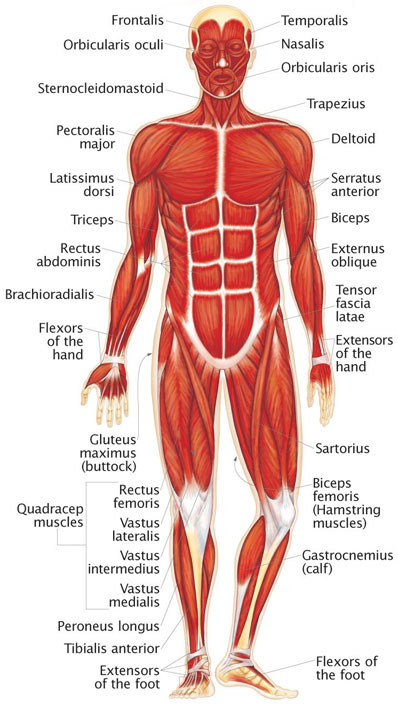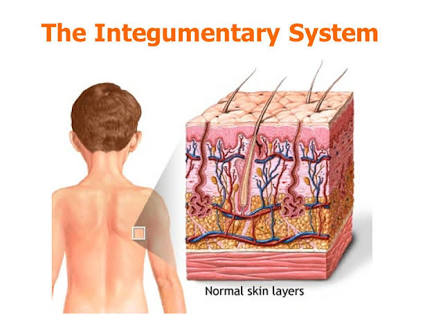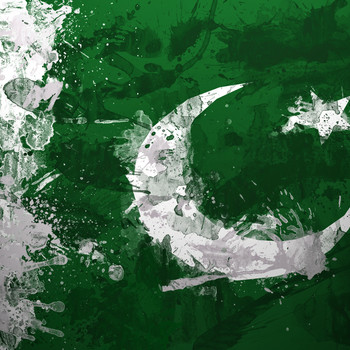What are the different body systems in human body and what are their functions?
1 Answer
There are total
Explanation:
These are muscular system, digestive system, integumentary system, skeletal system, circulatory system, respiratory system, lymphatic system, endocrine system, excretory system and reproductive system. All these systems contain their specific organs. However, these systems are somehow related to each other.
Breif concept to their functions is as follows:
Muscular system
The muscular system, in vertebrates, is controlled through the nervous system, although some muscles, like cardiac muscle & muscles in stomach walls, can be completely autonomous. And others like, skeletal muscles are under conscious control.
Muscles run throughout the human body. Each muscle has a specific name according to it's location or function. All these muscles work and render human body to function normally. For example, when you want to play flute you have to pucker your lips, you can do so with the help of Orbicularis oris, a muscle surrounding the lips.

Digestive system
Food we eat is the body's source of fuel. Nutrients in food give the body's cells the energy they need to operate. Before food can be used it has to be broken down into tiny little pieces so it can be absorbed and used by the body. In humans, proteins need to be broken down into amino acids, starches into sugars, and fats into fatty acids and glycerol. The whole process of digestion is aided by chemical and nervous coordination.
 )
)
Integumentary system
The outermost layer of skin i.e epidermis is responsible for keeping water in the body and keeping other harmful chemicals and pathogens out.
And the layer that lies below epidermis i.e dermis performs major functions and also nourishes epidermis. It contains a number of structures including blood vessels, nerves, hair follicles, smooth muscle, glands and lymphatic tissue. It paly major role in thermoregulation.
The hypodermis is not part of the skin, and lies below the dermis. Its purpose is to attach the skin to underlying bone and muscle as well as supplying it with blood vessels and nerves.
![http://slideplayer.com/slide/10516670/] ( )
)
Skeletal system
Muscular and skeletal system works together to provide movements. Besides, skeletal system provide proper shape to our body. Without this system, human body can never be so organized as it is.
 )
)
Circulatory system
The circulatory system is extremely important in sustaining life. It’s proper functioning is responsible for the delivery of oxygen and nutrients to all cells, as well as the removal of carbon dioxide, waste products, maintenance of optimum pH, and the mobility of the elements, proteins and cells, of the lymphatic system.
Heart pumps the blood throughout the body i.e from head to toe.
)
Respiratory system
The respiratory tract is the path of air that starts from the nasal cavity and end in smaller alveoli in lungs. It's major role is in breathing, no doubt an inevitable process. Besides, respiratory system also regulates blood
 )
)
Nervous system
Nervous system is involved in Nervous coordination . Nervous system is divided into central nervous system(CNS) & peripheral nervous system(PNS). CNS represents the largest part of the nervous system, including the brain and the spinal cord, Together, with the peripheral nervous system (PNS), it has a fundamental role in the control of behaviour.
Nervous system communicate with several other body systems. For example: Even when we haven't started eating, our brain starts telling our digestive organs i.e pancreas and stomach via nerves about the expected entry of food. And pancreas stimulated by neural signals produce about
 )
)
Lymphatic system
The lymphatic system helps Defend the body against foreign invaders. It destroys the bacteria and viruses through lymphocyte and macrophages with present within lymph nodes. Lymphatic system is involved in absorption of fat globules which are released by interstitial cells and the products of digestion of fats are absorbed.
Spleen filters the blood. It destroys aged red blood cells and foreign particles from blood via it's lymphocytes & macrophages.
 )
)
Endocrine system
Endocrine system is involved in Chemical coordination. It constitutes
Endocrine system is involved in controlling growth, metabolism, sexual development, maintaining homeostasis etc...
Endocrine and nervous system work together and aid other organ systems to perform their functions.
)
Excretory system
Excretion is the process of eliminating, from an organism, waste products of metabolism and other materials that are of no use. The most salient organs of this system are kidneys. Kidneys with the help of their functional units i.e nephrons, maintains an appropriate fluid volume by regulating the amount of water that is excreted in the urine, regulate concentrations of various electrolytes in the body fluids, maintain normal
 )
)
Reproductive system
All living things reproduce. This is something that sets the living apart from non-living. Even though the reproductive system is essential to keeping a species alive, it is not that essential for keeping an individual alive.
As in case of sexual reproduction, the specific traits are inherited from parents to their offspring. So, in this case reproduction is important in conservation of certain genetic makeups. While if we talk about asexual reproduction then its merely involved in producing new individual. Because there is no exchange of genetical materials in asexual reproduction.
 )
)
Hope it helps!

